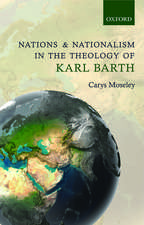Political Islam in a Time of Revolt: Islam and Nationalism
Editat de Ferran Izquierdo Brichs, John Etherington, Laura Feliuen Limba Engleză Hardback – 14 aug 2017
| Toate formatele și edițiile | Preț | Express |
|---|---|---|
| Paperback (1) | 724.17 lei 6-8 săpt. | |
| Springer International Publishing – 13 mai 2018 | 724.17 lei 6-8 săpt. | |
| Hardback (1) | 729.36 lei 6-8 săpt. | |
| Springer International Publishing – 14 aug 2017 | 729.36 lei 6-8 săpt. |
Preț: 729.36 lei
Preț vechi: 889.47 lei
-18% Nou
Puncte Express: 1094
Preț estimativ în valută:
139.58€ • 145.19$ • 115.23£
139.58€ • 145.19$ • 115.23£
Carte tipărită la comandă
Livrare economică 15-29 aprilie
Preluare comenzi: 021 569.72.76
Specificații
ISBN-13: 9783319528328
ISBN-10: 3319528327
Pagini: 296
Ilustrații: VI, 280 p. 1 illus.
Dimensiuni: 148 x 210 x 23 mm
Greutate: 0.49 kg
Ediția:1st ed. 2017
Editura: Springer International Publishing
Colecția Palgrave Macmillan
Seria Islam and Nationalism
Locul publicării:Cham, Switzerland
ISBN-10: 3319528327
Pagini: 296
Ilustrații: VI, 280 p. 1 illus.
Dimensiuni: 148 x 210 x 23 mm
Greutate: 0.49 kg
Ediția:1st ed. 2017
Editura: Springer International Publishing
Colecția Palgrave Macmillan
Seria Islam and Nationalism
Locul publicării:Cham, Switzerland
Cuprins
Chapter 1. From Revolution to Moderation? The Long Road of Political Islam.- Chapter 2. Lebanon and the Islamist Victory in a Multi-Faith Environment.- Chapter 3. The Battles of Political Islam in Syria.-
Chapter 4. Between Pragmatism and Ideological Zeal: The Path of Palestinian Political Islam.- Chapter 5. Islamist Forces in Contemporary Egypt: The End of Conventional Dualities.- Chapter 6. Political Islam in Libya: Vanguards Before and After the War.- Chapter 7. Political Islam in Tunisia: The Changing Landscape.- Chapter 8. Algerian Islamism: Elites, Power Resources and Power Relations.- Chapter 9. Political Islam in Morocco: Islamic Principles as a Resource for Political Power.- Chapter 10. Evolution of the Islamist Groups in Mauritania.- Chapter 11. Conclusions.
Chapter 4. Between Pragmatism and Ideological Zeal: The Path of Palestinian Political Islam.- Chapter 5. Islamist Forces in Contemporary Egypt: The End of Conventional Dualities.- Chapter 6. Political Islam in Libya: Vanguards Before and After the War.- Chapter 7. Political Islam in Tunisia: The Changing Landscape.- Chapter 8. Algerian Islamism: Elites, Power Resources and Power Relations.- Chapter 9. Political Islam in Morocco: Islamic Principles as a Resource for Political Power.- Chapter 10. Evolution of the Islamist Groups in Mauritania.- Chapter 11. Conclusions.
Notă biografică
Ferran Izquierdo Brichs is Professor in International Relations at Autonomous University of Barcelona, Spain. His research is focused on the sociology of power and the Arab world. He has published numerous articles and books on these issues.
John Etherington is Research Fellow on Political Science at Autonomous University of Barcelona, Spain. His research is mainly focused on themes such as territorial governance, nationalism and, more recently, Islamism in the Arab world. He has published numerous journal articles and book chapters on all of these themes.
Laura Feliu is Professor in International Relations at Autonomous University of Barcelona, Spain. She has extensively worked and published on international human rights promotion and international relations of the MENA region.
John Etherington is Research Fellow on Political Science at Autonomous University of Barcelona, Spain. His research is mainly focused on themes such as territorial governance, nationalism and, more recently, Islamism in the Arab world. He has published numerous journal articles and book chapters on all of these themes.
Laura Feliu is Professor in International Relations at Autonomous University of Barcelona, Spain. She has extensively worked and published on international human rights promotion and international relations of the MENA region.
Textul de pe ultima copertă
This book explores the increasing political and social prominence of Islamist groups across the Middle East in recent years. The aftermath of the 2011 uprisings saw some groups access or even control political institutions through success at the ballot box, while there has also been a marked resurgence of armed Islamist groups that have had profound effects at both the national and regional level. This volume helps us to understand the nature and development of organised political Islam over recent decades in several key Arab and Mediterranean countries: Mauritania, Morocco, Algeria, Tunisia, Libya, Egypt, Syria, Lebanon, the Palestinian Territories, and Turkey. The book identifies the central social and political Islamist actors, traces their ideological differences and similarities, and analyses power relations both within and between these organizations in the context of political instability and uncertainty. It will be of interest to students and scholars across a broad range ofdisciplines including political science, sociology, and international relations.
Caracteristici
Applies a common theoretical approach to understand the behaviour of Islamist actors Provides a comparative study across 10 countries in the MENA region Contributes to our understanding of recent developments in the region, giving valuable insights into the political dynamics of Arab Mediterranean countries






















